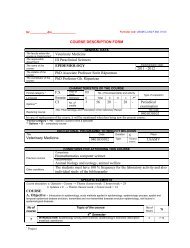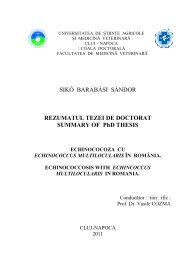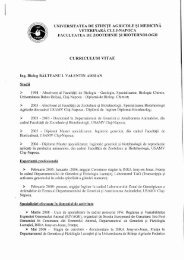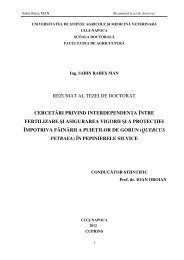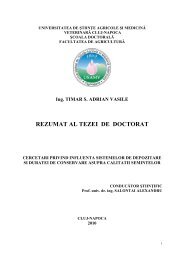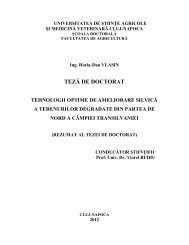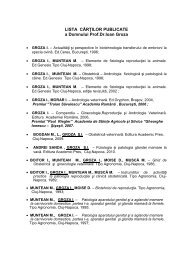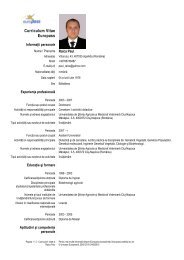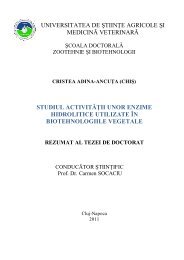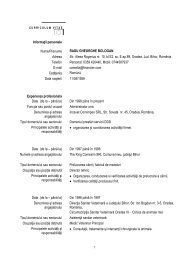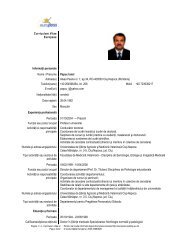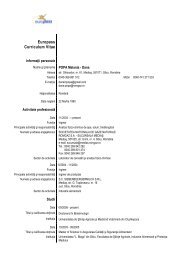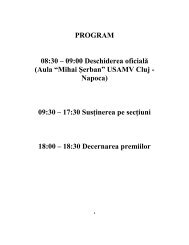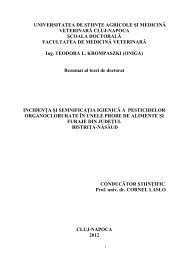self evaluation report - Universitatea de Ştiinţe Agricole şi Medicină ...
self evaluation report - Universitatea de Ştiinţe Agricole şi Medicină ...
self evaluation report - Universitatea de Ştiinţe Agricole şi Medicină ...
You also want an ePaper? Increase the reach of your titles
YUMPU automatically turns print PDFs into web optimized ePapers that Google loves.
supporter of Slow Food Concept and Fairs. USAMV Cluj-Napoca is an active member within two university<br />
consortium, the local consortium of Cluj- Napoca universities, and the consortium of all USAMV universities<br />
across the country.<br />
The option of USAMV Cluj-Napoca towards Sustainable Development ma<strong>de</strong> it a strong actor in promoting the<br />
regional strategy for bioenergy and, together with the Regional Development Agency, USAMV Cluj-Napoca<br />
formulated the Action Plan for Renewable Energy Implementation: “Towards 2020”.<br />
At the national higher education level, USAMV Cluj-Napoca aims to preserve its position in top 12 best<br />
universities, by promoting advanced research and excellence in education.<br />
At international level, USAMV Cluj-Napoca has continuously <strong>de</strong>veloped cooperation with other universities<br />
(currently USAMV Cluj-Napoca has cooperation agreements with more than 30 universities), RTD structures<br />
and companies, all over Europe, in US and Canada (see: Appendix – International relations), cooperation in<br />
education via trans-national projects with USAMV Cluj-Napoca as national lea<strong>de</strong>r, promoting integrated pilot<br />
projects with significant results in <strong>de</strong>veloping mo<strong>de</strong>rn teaching/learning tools, and international cooperation<br />
via Leonardo da Vinci, Comenius and Transnational Networks on specific topics regarding the sustainable<br />
<strong>de</strong>velopment. These projects have represented the starting point for RTD international cooperation, the<br />
university being an active partner in some FP6 and FP7 projects.<br />
Management policy as a reflection of mission and goals. USAMV Cluj-Napoca management policy can be<br />
characterized by “long-lasting values, in a flexible approach”; this approach allowing fast action for<br />
capitalization of university’s strong points, finding solutions to correct the weak points, diminishing the risks,<br />
consi<strong>de</strong>ring the threats, and approaching the opportunities. The USAMV Action Plan is related to this<br />
management policy, and was produced by an internal analysis that takes place at least once per year and<br />
being supported by benchmarking sessions, various external audits and <strong>evaluation</strong>s. As mentioned above, the<br />
major <strong>de</strong>cisions in the past 10 years were of high importance for <strong>de</strong>veloping new strategies and <strong>de</strong>cisions<br />
making for the future. The role of the bottom-up approach of the management structures and their<br />
involvement, from <strong>de</strong>partments to faculties and university level, is of high importance for the coherent and<br />
transparent <strong>de</strong>cision making and communication processes, and therefore supports the university’s<br />
sustainable <strong>de</strong>velopment.<br />
4.2. Aca<strong>de</strong>mic profile<br />
Analysis of educational and research approaches. The integrated management resources for quality<br />
assurance of the education, training and research processes represent an approach that proved its viability in<br />
time. As already mentioned, an integrated approach in education and research activities is the base for the<br />
sustainable <strong>de</strong>velopment of USAMV Cluj-Napoca, aiming to support the quality assurance and continued<br />
improvement in education. Curriculum reforms following the Bologna process are necessary and need to be<br />
implemented within every curriculum, to improve the quality of education and to accelerate and stimulate the<br />
implementation of the internal and external accreditation procedures, according to the national legislation<br />
and the ARACIS requirements.<br />
Each study program <strong>de</strong>veloped by the 4 faculties of USAMV Cluj-Napoca has a well <strong>de</strong>fined structure and<br />
content. The courses at bachelor level (3 or 4 years bachelor - first cycle) and the specific curricula <strong>de</strong>fine,<br />
through the <strong>de</strong>tailed syllabus, the content, the outcomes, the <strong>evaluation</strong> method, for each course, and<br />
assigned ECTS (see: Appendix – ECTS system in USAMV Cluj-Napoca). Harmonizing the curricula content<br />
represents an ongoing process, where the teaching staff and the stu<strong>de</strong>nts are invited to contribute every 3<br />
years.<br />
An aca<strong>de</strong>mic year consists of 2 semesters, 14 weeks each, followed by a four-week examination period and a<br />
supplementary two-week examination period, in September. The total number of credits required to graduate<br />
from a bachelor’s <strong>de</strong>gree program, varies between 180 (study program: Biology) and 240 (all study programs<br />
for Engineering Sciences – Plant and animal Resources) credits, while for a master <strong>de</strong>gree program the total<br />
number of credits is of 90 or 120.<br />
Page 13 SELF-EVALUATION REPORT, March, 2012



